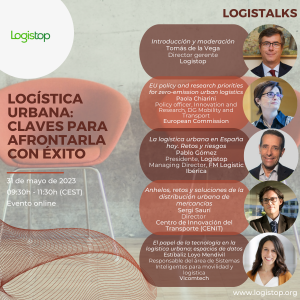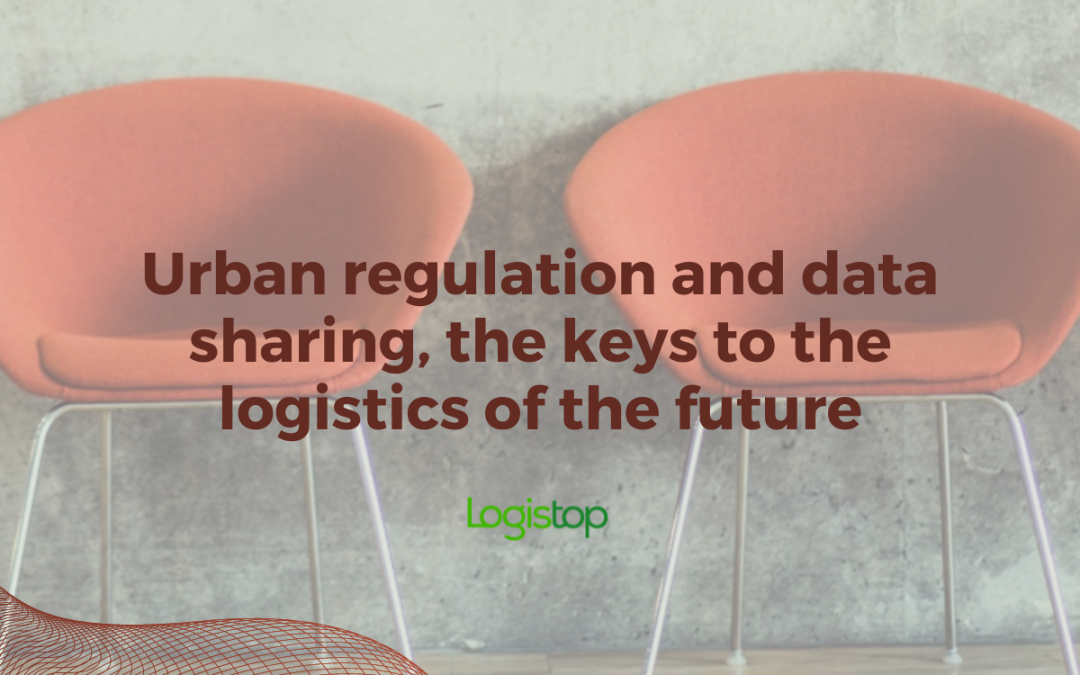-
The lack of available information and data sharing make it difficult to make the right decisions.
-
The future of urban distribution depends on collaboration.
-
Logistop has organised the LogisTalks online event “Urban logistics: keys to success” in which, together with experts in the field, we have analysed the keys to successfully facing these challenges posed by urban logistics.
We have counted with the participation of Paola Chiarini, Policy officer, Innovation and Research, DG Mobility and Transport, European Commission, Pablo Gómez, President, Logistop, and Managing Director, FM Logistic Ibérica, Sergi Saurí, Director, Centro de Innovación del Transporte (CENIT), Estíbaliz Loyo Mendivil, Head of Intelligent Systems for Mobility and Logistics, Vicomtech, and with the moderation of Tomás de la Vega, Managing Director, Logistop.

EU policy and research priorities for zero-emission urban logistics
The European Union’s new Urban Mobility Framework sets out the main priorities for EU action on urban mobility and logistics. In her presentation, Paola Chiarini provided an overview of the main EU policies and funding programmes to help develop, among other examples, sustainable solutions, improve multimodality, implement zero emission vehicles and increase efficiency in the sector in order to achieve more sustainable urban logistics.
Paola also highlighted the essential role that urban logistics plays in the functioning of urban economies. She stressed the need for collaboration between local authorities and private sector stakeholders to share knowledge on sustainable urban logistics management and planning, and that further work is needed at EU level to assess the need to collect and share more data on urban freight transport.
“We need to improve the environmental performance of freight transport through measures to increase its operational efficiency and to this end, the Greening Freight package will be published in Q2-Q3 of this year 2023”
Paola Chiarini, Policy officer, Innovation and Research, DG Mobility and Transport, European Commission
Urban logistics in Spain today. Challenges and risks
Pablo Gómez explained the current state of development of urban logistics in Spain and the challenges we face. In this sense, Pablo highlighted the need to have the street as a public service in order to move forward. In addition, another of the keys that we must face are the multiple and diverse existing casuistries, which are different in each city and which prevent large companies from being able to implement optimal solutions. Likewise, as urban distribution is not included in urban plans, there is no database and/or register, which, together with the lack of knowledge of the value of the service that is the delivery of goods, poses a series of challenges to be faced.
Among the challenges to be met, based on the key points raised by Pablo, are the following: 1) the creation of replicable models; 2) the digitalisation of services; 3) low-emission zones; and 4) the perception of value by the recipient of the products.
“We work with cities to design new models. We try, together with mayors and city councils, to establish the rules that can determine the urban layout of the future. It is a very open field and we are not certain of success, but we believe that, as a company, we must be defining the future, which, moreover, must be collaborative”
Pablo Gómez, President, Logistop, and Managing Director, FM Logistic Ibérica
Challenges and solutions in urban freight distribution
Last mile distribution in recent years has become one of the main challenges for cities to manage mobility, especially in the wake of the rise of e-commerce. Defining, structuring and implementing last-mile solutions to reduce vehicle-kilometres and emissions from freight vehicles, while at the same time being compatible with the economic needs of cities, is one of the main challenges facing municipal authorities, as Sergi Saurí pointed out in his speech. In the end, the ideal would be to have urban distribution models at the city level based on coordination, centralisation, consolidation and unification, he added.
Sergi also explained some of the solutions already implemented and the main difficulties currently existing to develop them, and, from there, to establish a road map of the challenges that still lie ahead. Sergi grouped these challenges into digitalisation (optimisation of operations, efficiency…), regularisation (regulation of access and loading and unloading, urban planning regulation criteria…), energy model (electric vehicles, cargobikes…) and collaborative economy and business models.
“We are talking about a sector in which many stakeholders are involved with divergent interests and objectives, which complicates the implementation of certain instruments”
Sergi Saurí, Director, Centro de Innovación del Transporte (CENIT)
The role of technology in urban logistics: data spaces
The redesign of cities is giving rise to new trends and challenges (such as those discussed so far) that urban logistics must face. In this context, Estíbaliz Loyo emphasised the importance of data and the fundamental role that technology is developing, enabling new operating schemes.
Estíbaliz highlighted the important role of data spaces to achieve good data management, which, in turn, is secure, efficient and provides great added value. Furthermore, Estíbaliz points out, the importance of data lies in the possibilities it offers when it comes to optimising distribution models, predicting demand, providing dynamic data in real time, among others.
“Data alone is not of value, what makes it important is the technology behind it, which is what allows data to be converted into valuable information”
Estíbaliz Loyo Mendivil, Head of Intelligent Systems for Mobility and Logistics, Vicomtech
About Logistop
At Logistop we transform the supply chain through innovation, helping industry and companies to become more efficient and sustainable.
We are a multidisciplinary and inter-territorial working space in the logistics innovation arena formed by all the actors involved in the supply chain, as well as universities, technology centres, associations and specialised consultancy firms.
One of Logistop’s main objectives is:
- To promote the need for innovation among companies involved in the logistics sector;
- To promote innovation projects;
- To communicate the real needs of the sector at an institutional level.

